Organisational Behaviour Report: M&S Case Study and Analysis
VerifiedAdded on 2022/12/27
|14
|4661
|58
Report
AI Summary
This report provides an in-depth analysis of organisational behaviour, focusing on Marks & Spencer as a case study. It examines the influence of organisational culture, power, and politics on individual and team behaviour and performance, referencing Handy's model and French & Raven's power bases. The report evaluates content and process theories of motivation, including Alderfer's ERG theory, Herzberg's two-factor theory, Adams' equity theory, and Locke's goal-setting theory, to determine how they enable effective achievement of goals. It also differentiates between effective and ineffective teams and applies concepts and philosophies of organisational behaviour within the M&S context. The report concludes by highlighting the importance of understanding and managing organisational behaviour to enhance performance and achieve organizational objectives. The report discusses several motivational techniques and explains the importance of motivation in achieving organisational goals. The report also contains an analysis of organisational politics.
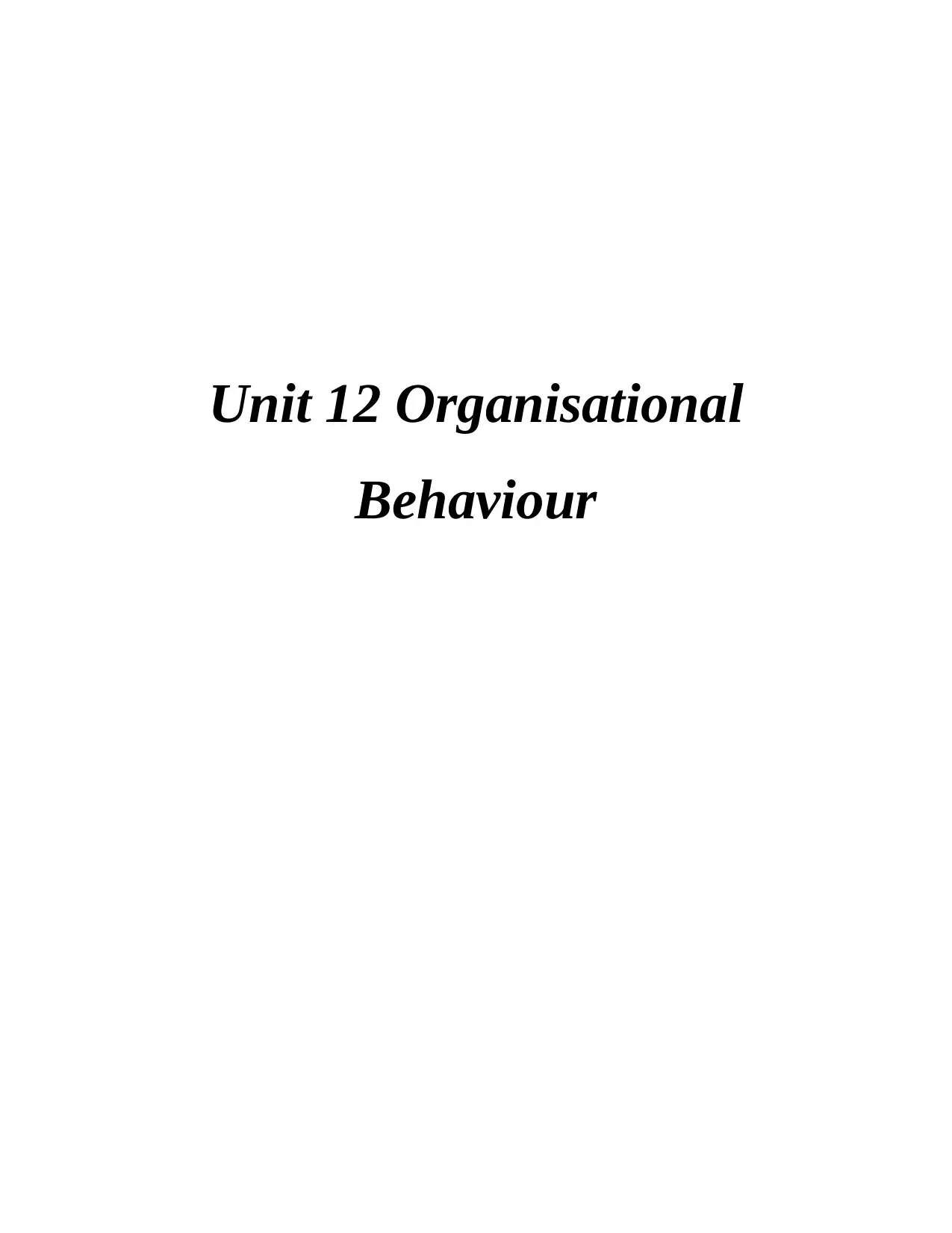
Unit 12 Organisational
Behaviour
Behaviour
Paraphrase This Document
Need a fresh take? Get an instant paraphrase of this document with our AI Paraphraser
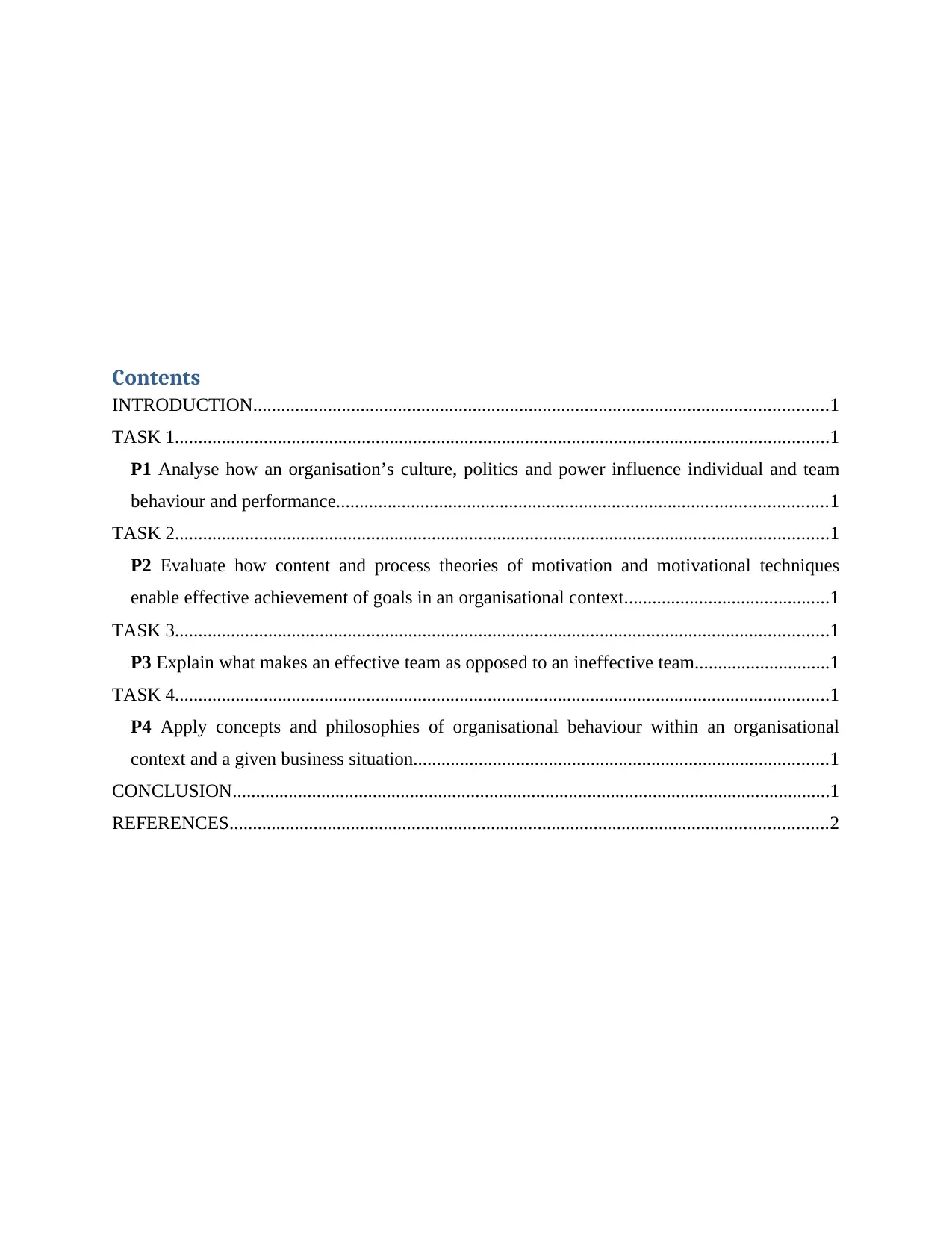
Contents
INTRODUCTION...........................................................................................................................1
TASK 1............................................................................................................................................1
P1 Analyse how an organisation’s culture, politics and power influence individual and team
behaviour and performance.........................................................................................................1
TASK 2............................................................................................................................................1
P2 Evaluate how content and process theories of motivation and motivational techniques
enable effective achievement of goals in an organisational context............................................1
TASK 3............................................................................................................................................1
P3 Explain what makes an effective team as opposed to an ineffective team.............................1
TASK 4............................................................................................................................................1
P4 Apply concepts and philosophies of organisational behaviour within an organisational
context and a given business situation.........................................................................................1
CONCLUSION................................................................................................................................1
REFERENCES................................................................................................................................2
INTRODUCTION...........................................................................................................................1
TASK 1............................................................................................................................................1
P1 Analyse how an organisation’s culture, politics and power influence individual and team
behaviour and performance.........................................................................................................1
TASK 2............................................................................................................................................1
P2 Evaluate how content and process theories of motivation and motivational techniques
enable effective achievement of goals in an organisational context............................................1
TASK 3............................................................................................................................................1
P3 Explain what makes an effective team as opposed to an ineffective team.............................1
TASK 4............................................................................................................................................1
P4 Apply concepts and philosophies of organisational behaviour within an organisational
context and a given business situation.........................................................................................1
CONCLUSION................................................................................................................................1
REFERENCES................................................................................................................................2
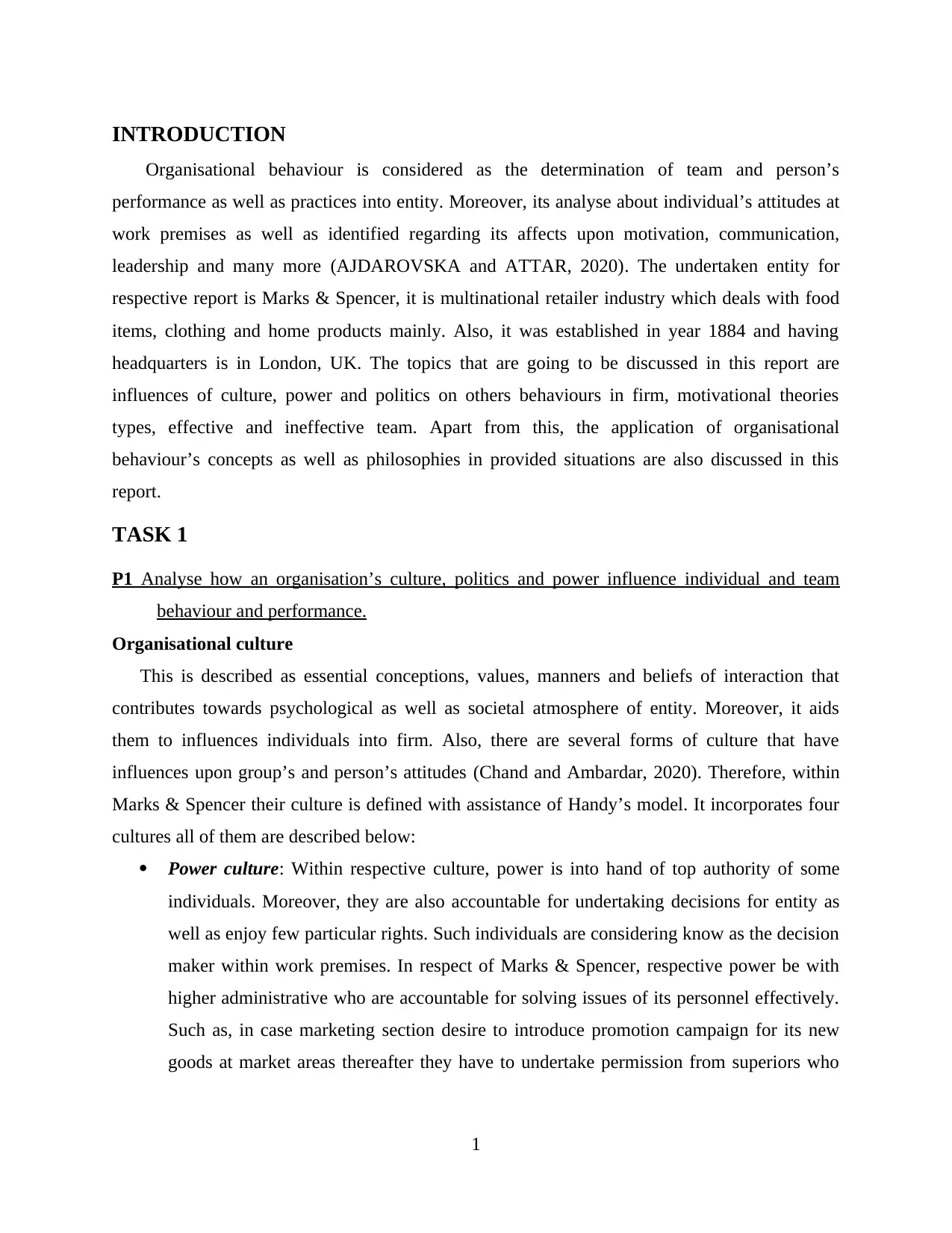
INTRODUCTION
Organisational behaviour is considered as the determination of team and person’s
performance as well as practices into entity. Moreover, its analyse about individual’s attitudes at
work premises as well as identified regarding its affects upon motivation, communication,
leadership and many more (AJDAROVSKA and ATTAR, 2020). The undertaken entity for
respective report is Marks & Spencer, it is multinational retailer industry which deals with food
items, clothing and home products mainly. Also, it was established in year 1884 and having
headquarters is in London, UK. The topics that are going to be discussed in this report are
influences of culture, power and politics on others behaviours in firm, motivational theories
types, effective and ineffective team. Apart from this, the application of organisational
behaviour’s concepts as well as philosophies in provided situations are also discussed in this
report.
TASK 1
P1 Analyse how an organisation’s culture, politics and power influence individual and team
behaviour and performance.
Organisational culture
This is described as essential conceptions, values, manners and beliefs of interaction that
contributes towards psychological as well as societal atmosphere of entity. Moreover, it aids
them to influences individuals into firm. Also, there are several forms of culture that have
influences upon group’s and person’s attitudes (Chand and Ambardar, 2020). Therefore, within
Marks & Spencer their culture is defined with assistance of Handy’s model. It incorporates four
cultures all of them are described below:
Power culture: Within respective culture, power is into hand of top authority of some
individuals. Moreover, they are also accountable for undertaking decisions for entity as
well as enjoy few particular rights. Such individuals are considering know as the decision
maker within work premises. In respect of Marks & Spencer, respective power be with
higher administrative who are accountable for solving issues of its personnel effectively.
Such as, in case marketing section desire to introduce promotion campaign for its new
goods at market areas thereafter they have to undertake permission from superiors who
1
Organisational behaviour is considered as the determination of team and person’s
performance as well as practices into entity. Moreover, its analyse about individual’s attitudes at
work premises as well as identified regarding its affects upon motivation, communication,
leadership and many more (AJDAROVSKA and ATTAR, 2020). The undertaken entity for
respective report is Marks & Spencer, it is multinational retailer industry which deals with food
items, clothing and home products mainly. Also, it was established in year 1884 and having
headquarters is in London, UK. The topics that are going to be discussed in this report are
influences of culture, power and politics on others behaviours in firm, motivational theories
types, effective and ineffective team. Apart from this, the application of organisational
behaviour’s concepts as well as philosophies in provided situations are also discussed in this
report.
TASK 1
P1 Analyse how an organisation’s culture, politics and power influence individual and team
behaviour and performance.
Organisational culture
This is described as essential conceptions, values, manners and beliefs of interaction that
contributes towards psychological as well as societal atmosphere of entity. Moreover, it aids
them to influences individuals into firm. Also, there are several forms of culture that have
influences upon group’s and person’s attitudes (Chand and Ambardar, 2020). Therefore, within
Marks & Spencer their culture is defined with assistance of Handy’s model. It incorporates four
cultures all of them are described below:
Power culture: Within respective culture, power is into hand of top authority of some
individuals. Moreover, they are also accountable for undertaking decisions for entity as
well as enjoy few particular rights. Such individuals are considering know as the decision
maker within work premises. In respect of Marks & Spencer, respective power be with
higher administrative who are accountable for solving issues of its personnel effectively.
Such as, in case marketing section desire to introduce promotion campaign for its new
goods at market areas thereafter they have to undertake permission from superiors who
1
⊘ This is a preview!⊘
Do you want full access?
Subscribe today to unlock all pages.

Trusted by 1+ million students worldwide
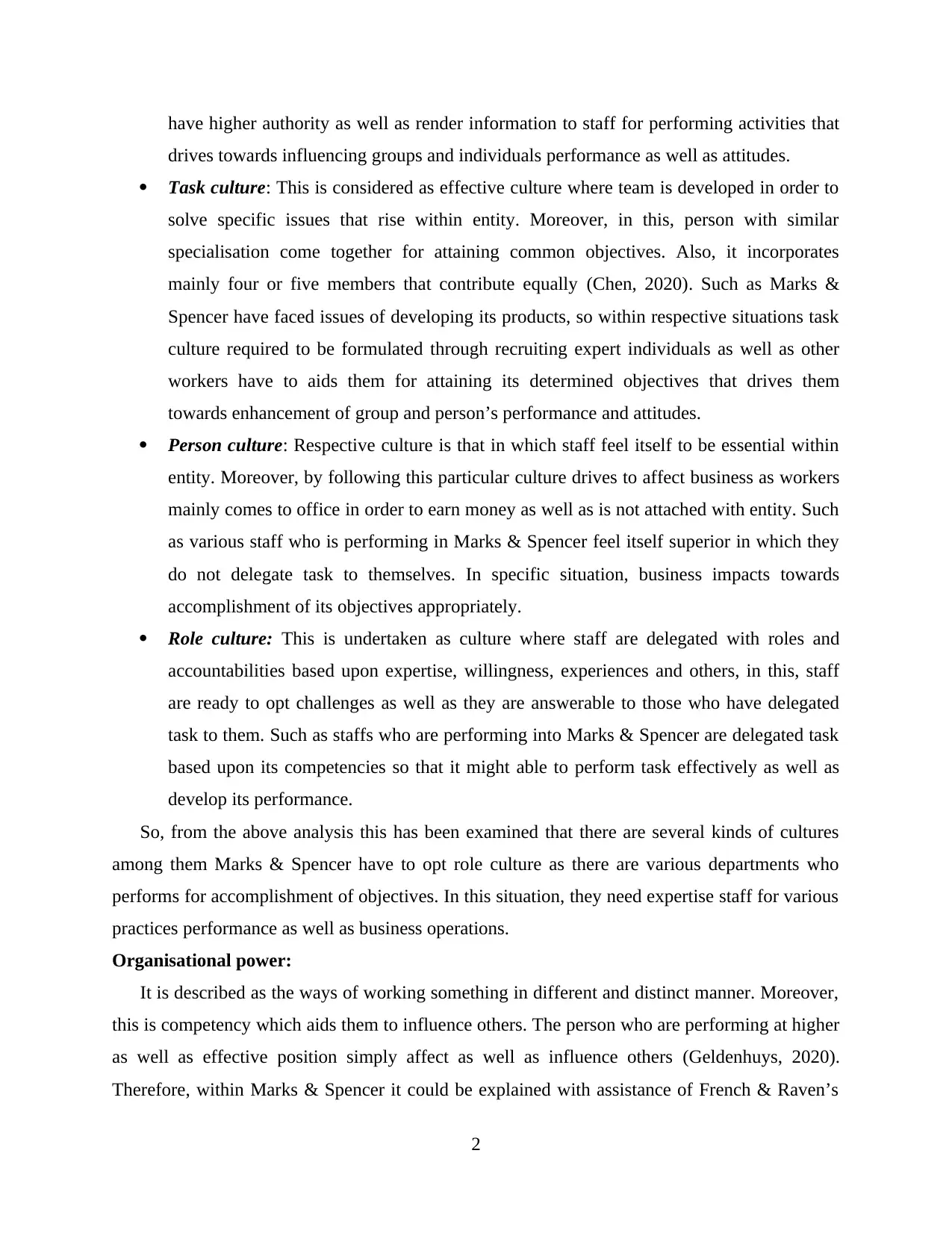
have higher authority as well as render information to staff for performing activities that
drives towards influencing groups and individuals performance as well as attitudes.
Task culture: This is considered as effective culture where team is developed in order to
solve specific issues that rise within entity. Moreover, in this, person with similar
specialisation come together for attaining common objectives. Also, it incorporates
mainly four or five members that contribute equally (Chen, 2020). Such as Marks &
Spencer have faced issues of developing its products, so within respective situations task
culture required to be formulated through recruiting expert individuals as well as other
workers have to aids them for attaining its determined objectives that drives them
towards enhancement of group and person’s performance and attitudes.
Person culture: Respective culture is that in which staff feel itself to be essential within
entity. Moreover, by following this particular culture drives to affect business as workers
mainly comes to office in order to earn money as well as is not attached with entity. Such
as various staff who is performing in Marks & Spencer feel itself superior in which they
do not delegate task to themselves. In specific situation, business impacts towards
accomplishment of its objectives appropriately.
Role culture: This is undertaken as culture where staff are delegated with roles and
accountabilities based upon expertise, willingness, experiences and others, in this, staff
are ready to opt challenges as well as they are answerable to those who have delegated
task to them. Such as staffs who are performing into Marks & Spencer are delegated task
based upon its competencies so that it might able to perform task effectively as well as
develop its performance.
So, from the above analysis this has been examined that there are several kinds of cultures
among them Marks & Spencer have to opt role culture as there are various departments who
performs for accomplishment of objectives. In this situation, they need expertise staff for various
practices performance as well as business operations.
Organisational power:
It is described as the ways of working something in different and distinct manner. Moreover,
this is competency which aids them to influence others. The person who are performing at higher
as well as effective position simply affect as well as influence others (Geldenhuys, 2020).
Therefore, within Marks & Spencer it could be explained with assistance of French & Raven’s
2
drives towards influencing groups and individuals performance as well as attitudes.
Task culture: This is considered as effective culture where team is developed in order to
solve specific issues that rise within entity. Moreover, in this, person with similar
specialisation come together for attaining common objectives. Also, it incorporates
mainly four or five members that contribute equally (Chen, 2020). Such as Marks &
Spencer have faced issues of developing its products, so within respective situations task
culture required to be formulated through recruiting expert individuals as well as other
workers have to aids them for attaining its determined objectives that drives them
towards enhancement of group and person’s performance and attitudes.
Person culture: Respective culture is that in which staff feel itself to be essential within
entity. Moreover, by following this particular culture drives to affect business as workers
mainly comes to office in order to earn money as well as is not attached with entity. Such
as various staff who is performing in Marks & Spencer feel itself superior in which they
do not delegate task to themselves. In specific situation, business impacts towards
accomplishment of its objectives appropriately.
Role culture: This is undertaken as culture where staff are delegated with roles and
accountabilities based upon expertise, willingness, experiences and others, in this, staff
are ready to opt challenges as well as they are answerable to those who have delegated
task to them. Such as staffs who are performing into Marks & Spencer are delegated task
based upon its competencies so that it might able to perform task effectively as well as
develop its performance.
So, from the above analysis this has been examined that there are several kinds of cultures
among them Marks & Spencer have to opt role culture as there are various departments who
performs for accomplishment of objectives. In this situation, they need expertise staff for various
practices performance as well as business operations.
Organisational power:
It is described as the ways of working something in different and distinct manner. Moreover,
this is competency which aids them to influence others. The person who are performing at higher
as well as effective position simply affect as well as influence others (Geldenhuys, 2020).
Therefore, within Marks & Spencer it could be explained with assistance of French & Raven’s
2
Paraphrase This Document
Need a fresh take? Get an instant paraphrase of this document with our AI Paraphraser
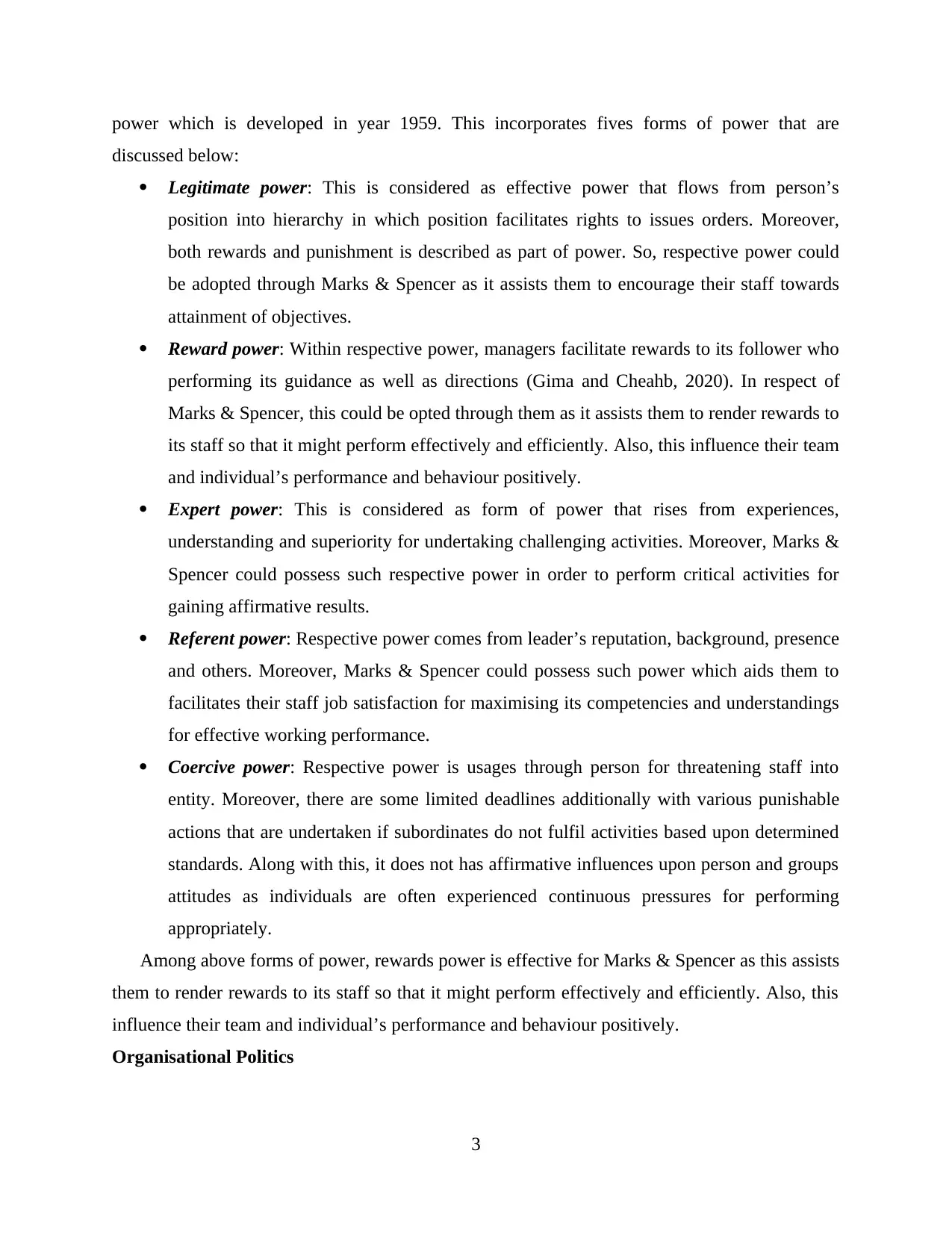
power which is developed in year 1959. This incorporates fives forms of power that are
discussed below:
Legitimate power: This is considered as effective power that flows from person’s
position into hierarchy in which position facilitates rights to issues orders. Moreover,
both rewards and punishment is described as part of power. So, respective power could
be adopted through Marks & Spencer as it assists them to encourage their staff towards
attainment of objectives.
Reward power: Within respective power, managers facilitate rewards to its follower who
performing its guidance as well as directions (Gima and Cheahb, 2020). In respect of
Marks & Spencer, this could be opted through them as it assists them to render rewards to
its staff so that it might perform effectively and efficiently. Also, this influence their team
and individual’s performance and behaviour positively.
Expert power: This is considered as form of power that rises from experiences,
understanding and superiority for undertaking challenging activities. Moreover, Marks &
Spencer could possess such respective power in order to perform critical activities for
gaining affirmative results.
Referent power: Respective power comes from leader’s reputation, background, presence
and others. Moreover, Marks & Spencer could possess such power which aids them to
facilitates their staff job satisfaction for maximising its competencies and understandings
for effective working performance.
Coercive power: Respective power is usages through person for threatening staff into
entity. Moreover, there are some limited deadlines additionally with various punishable
actions that are undertaken if subordinates do not fulfil activities based upon determined
standards. Along with this, it does not has affirmative influences upon person and groups
attitudes as individuals are often experienced continuous pressures for performing
appropriately.
Among above forms of power, rewards power is effective for Marks & Spencer as this assists
them to render rewards to its staff so that it might perform effectively and efficiently. Also, this
influence their team and individual’s performance and behaviour positively.
Organisational Politics
3
discussed below:
Legitimate power: This is considered as effective power that flows from person’s
position into hierarchy in which position facilitates rights to issues orders. Moreover,
both rewards and punishment is described as part of power. So, respective power could
be adopted through Marks & Spencer as it assists them to encourage their staff towards
attainment of objectives.
Reward power: Within respective power, managers facilitate rewards to its follower who
performing its guidance as well as directions (Gima and Cheahb, 2020). In respect of
Marks & Spencer, this could be opted through them as it assists them to render rewards to
its staff so that it might perform effectively and efficiently. Also, this influence their team
and individual’s performance and behaviour positively.
Expert power: This is considered as form of power that rises from experiences,
understanding and superiority for undertaking challenging activities. Moreover, Marks &
Spencer could possess such respective power in order to perform critical activities for
gaining affirmative results.
Referent power: Respective power comes from leader’s reputation, background, presence
and others. Moreover, Marks & Spencer could possess such power which aids them to
facilitates their staff job satisfaction for maximising its competencies and understandings
for effective working performance.
Coercive power: Respective power is usages through person for threatening staff into
entity. Moreover, there are some limited deadlines additionally with various punishable
actions that are undertaken if subordinates do not fulfil activities based upon determined
standards. Along with this, it does not has affirmative influences upon person and groups
attitudes as individuals are often experienced continuous pressures for performing
appropriately.
Among above forms of power, rewards power is effective for Marks & Spencer as this assists
them to render rewards to its staff so that it might perform effectively and efficiently. Also, this
influence their team and individual’s performance and behaviour positively.
Organisational Politics
3
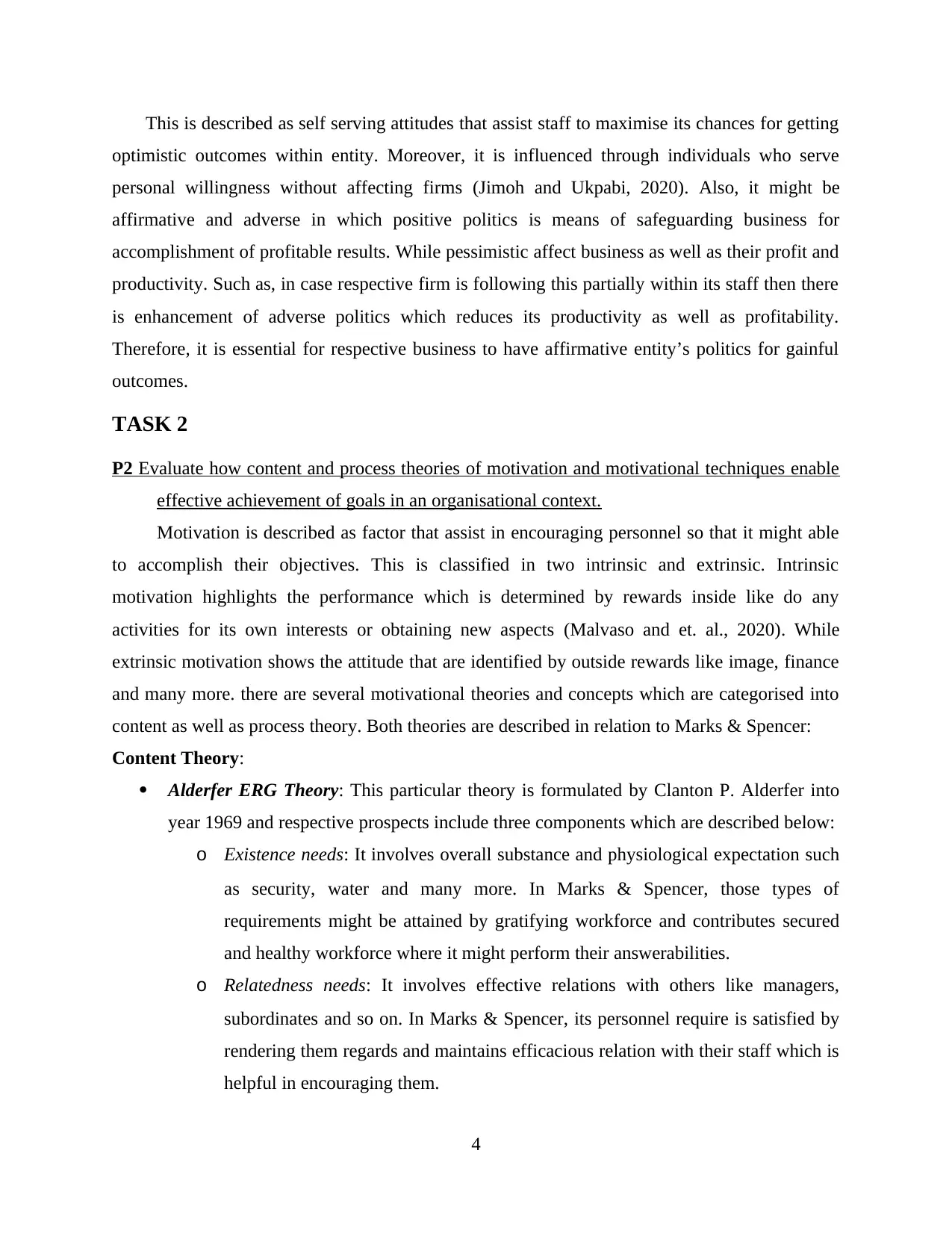
This is described as self serving attitudes that assist staff to maximise its chances for getting
optimistic outcomes within entity. Moreover, it is influenced through individuals who serve
personal willingness without affecting firms (Jimoh and Ukpabi, 2020). Also, it might be
affirmative and adverse in which positive politics is means of safeguarding business for
accomplishment of profitable results. While pessimistic affect business as well as their profit and
productivity. Such as, in case respective firm is following this partially within its staff then there
is enhancement of adverse politics which reduces its productivity as well as profitability.
Therefore, it is essential for respective business to have affirmative entity’s politics for gainful
outcomes.
TASK 2
P2 Evaluate how content and process theories of motivation and motivational techniques enable
effective achievement of goals in an organisational context.
Motivation is described as factor that assist in encouraging personnel so that it might able
to accomplish their objectives. This is classified in two intrinsic and extrinsic. Intrinsic
motivation highlights the performance which is determined by rewards inside like do any
activities for its own interests or obtaining new aspects (Malvaso and et. al., 2020). While
extrinsic motivation shows the attitude that are identified by outside rewards like image, finance
and many more. there are several motivational theories and concepts which are categorised into
content as well as process theory. Both theories are described in relation to Marks & Spencer:
Content Theory:
Alderfer ERG Theory: This particular theory is formulated by Clanton P. Alderfer into
year 1969 and respective prospects include three components which are described below:
o Existence needs: It involves overall substance and physiological expectation such
as security, water and many more. In Marks & Spencer, those types of
requirements might be attained by gratifying workforce and contributes secured
and healthy workforce where it might perform their answerabilities.
o Relatedness needs: It involves effective relations with others like managers,
subordinates and so on. In Marks & Spencer, its personnel require is satisfied by
rendering them regards and maintains efficacious relation with their staff which is
helpful in encouraging them.
4
optimistic outcomes within entity. Moreover, it is influenced through individuals who serve
personal willingness without affecting firms (Jimoh and Ukpabi, 2020). Also, it might be
affirmative and adverse in which positive politics is means of safeguarding business for
accomplishment of profitable results. While pessimistic affect business as well as their profit and
productivity. Such as, in case respective firm is following this partially within its staff then there
is enhancement of adverse politics which reduces its productivity as well as profitability.
Therefore, it is essential for respective business to have affirmative entity’s politics for gainful
outcomes.
TASK 2
P2 Evaluate how content and process theories of motivation and motivational techniques enable
effective achievement of goals in an organisational context.
Motivation is described as factor that assist in encouraging personnel so that it might able
to accomplish their objectives. This is classified in two intrinsic and extrinsic. Intrinsic
motivation highlights the performance which is determined by rewards inside like do any
activities for its own interests or obtaining new aspects (Malvaso and et. al., 2020). While
extrinsic motivation shows the attitude that are identified by outside rewards like image, finance
and many more. there are several motivational theories and concepts which are categorised into
content as well as process theory. Both theories are described in relation to Marks & Spencer:
Content Theory:
Alderfer ERG Theory: This particular theory is formulated by Clanton P. Alderfer into
year 1969 and respective prospects include three components which are described below:
o Existence needs: It involves overall substance and physiological expectation such
as security, water and many more. In Marks & Spencer, those types of
requirements might be attained by gratifying workforce and contributes secured
and healthy workforce where it might perform their answerabilities.
o Relatedness needs: It involves effective relations with others like managers,
subordinates and so on. In Marks & Spencer, its personnel require is satisfied by
rendering them regards and maintains efficacious relation with their staff which is
helpful in encouraging them.
4
⊘ This is a preview!⊘
Do you want full access?
Subscribe today to unlock all pages.

Trusted by 1+ million students worldwide
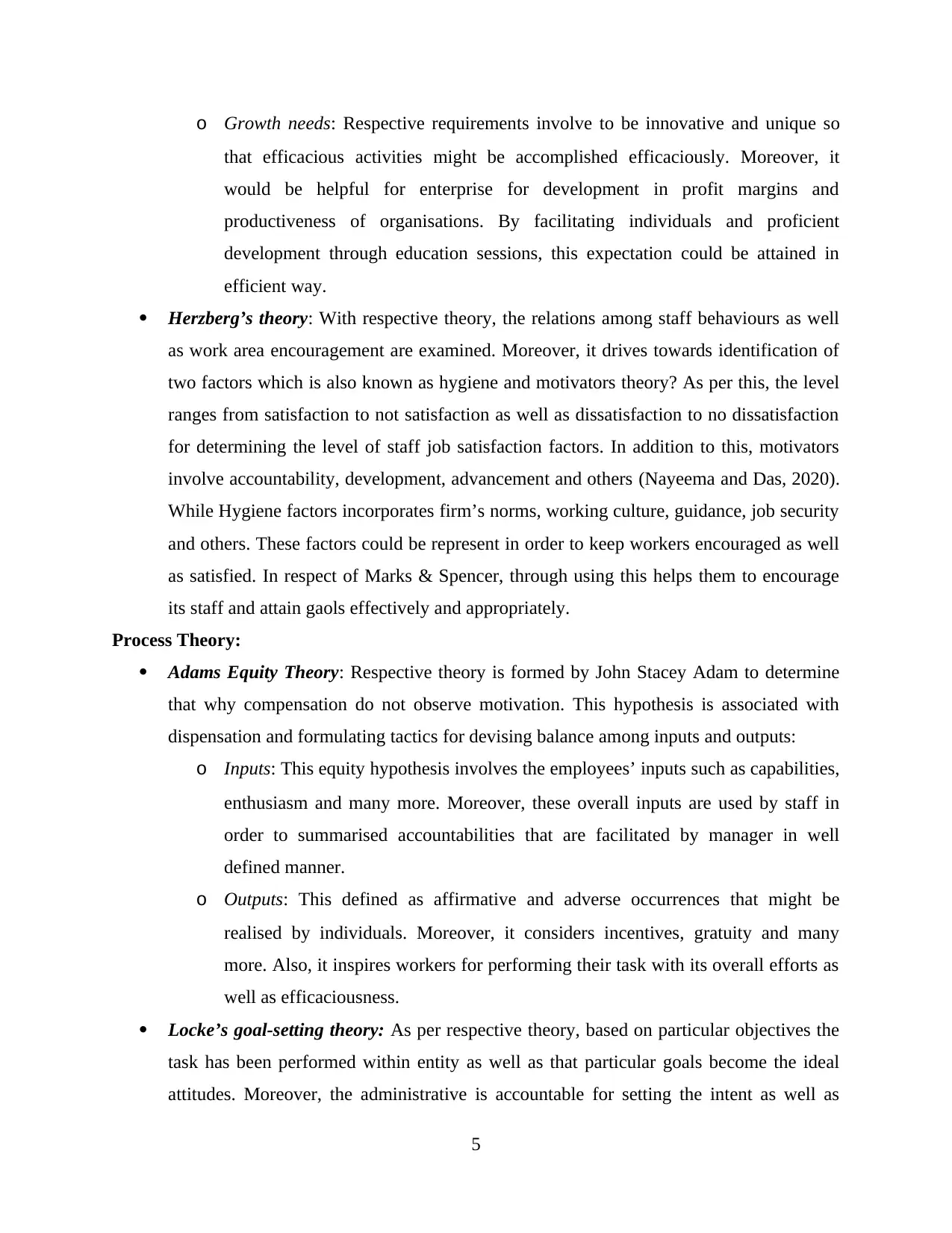
o Growth needs: Respective requirements involve to be innovative and unique so
that efficacious activities might be accomplished efficaciously. Moreover, it
would be helpful for enterprise for development in profit margins and
productiveness of organisations. By facilitating individuals and proficient
development through education sessions, this expectation could be attained in
efficient way.
Herzberg’s theory: With respective theory, the relations among staff behaviours as well
as work area encouragement are examined. Moreover, it drives towards identification of
two factors which is also known as hygiene and motivators theory? As per this, the level
ranges from satisfaction to not satisfaction as well as dissatisfaction to no dissatisfaction
for determining the level of staff job satisfaction factors. In addition to this, motivators
involve accountability, development, advancement and others (Nayeema and Das, 2020).
While Hygiene factors incorporates firm’s norms, working culture, guidance, job security
and others. These factors could be represent in order to keep workers encouraged as well
as satisfied. In respect of Marks & Spencer, through using this helps them to encourage
its staff and attain gaols effectively and appropriately.
Process Theory:
Adams Equity Theory: Respective theory is formed by John Stacey Adam to determine
that why compensation do not observe motivation. This hypothesis is associated with
dispensation and formulating tactics for devising balance among inputs and outputs:
o Inputs: This equity hypothesis involves the employees’ inputs such as capabilities,
enthusiasm and many more. Moreover, these overall inputs are used by staff in
order to summarised accountabilities that are facilitated by manager in well
defined manner.
o Outputs: This defined as affirmative and adverse occurrences that might be
realised by individuals. Moreover, it considers incentives, gratuity and many
more. Also, it inspires workers for performing their task with its overall efforts as
well as efficaciousness.
Locke’s goal-setting theory: As per respective theory, based on particular objectives the
task has been performed within entity as well as that particular goals become the ideal
attitudes. Moreover, the administrative is accountable for setting the intent as well as
5
that efficacious activities might be accomplished efficaciously. Moreover, it
would be helpful for enterprise for development in profit margins and
productiveness of organisations. By facilitating individuals and proficient
development through education sessions, this expectation could be attained in
efficient way.
Herzberg’s theory: With respective theory, the relations among staff behaviours as well
as work area encouragement are examined. Moreover, it drives towards identification of
two factors which is also known as hygiene and motivators theory? As per this, the level
ranges from satisfaction to not satisfaction as well as dissatisfaction to no dissatisfaction
for determining the level of staff job satisfaction factors. In addition to this, motivators
involve accountability, development, advancement and others (Nayeema and Das, 2020).
While Hygiene factors incorporates firm’s norms, working culture, guidance, job security
and others. These factors could be represent in order to keep workers encouraged as well
as satisfied. In respect of Marks & Spencer, through using this helps them to encourage
its staff and attain gaols effectively and appropriately.
Process Theory:
Adams Equity Theory: Respective theory is formed by John Stacey Adam to determine
that why compensation do not observe motivation. This hypothesis is associated with
dispensation and formulating tactics for devising balance among inputs and outputs:
o Inputs: This equity hypothesis involves the employees’ inputs such as capabilities,
enthusiasm and many more. Moreover, these overall inputs are used by staff in
order to summarised accountabilities that are facilitated by manager in well
defined manner.
o Outputs: This defined as affirmative and adverse occurrences that might be
realised by individuals. Moreover, it considers incentives, gratuity and many
more. Also, it inspires workers for performing their task with its overall efforts as
well as efficaciousness.
Locke’s goal-setting theory: As per respective theory, based on particular objectives the
task has been performed within entity as well as that particular goals become the ideal
attitudes. Moreover, the administrative is accountable for setting the intent as well as
5
Paraphrase This Document
Need a fresh take? Get an instant paraphrase of this document with our AI Paraphraser
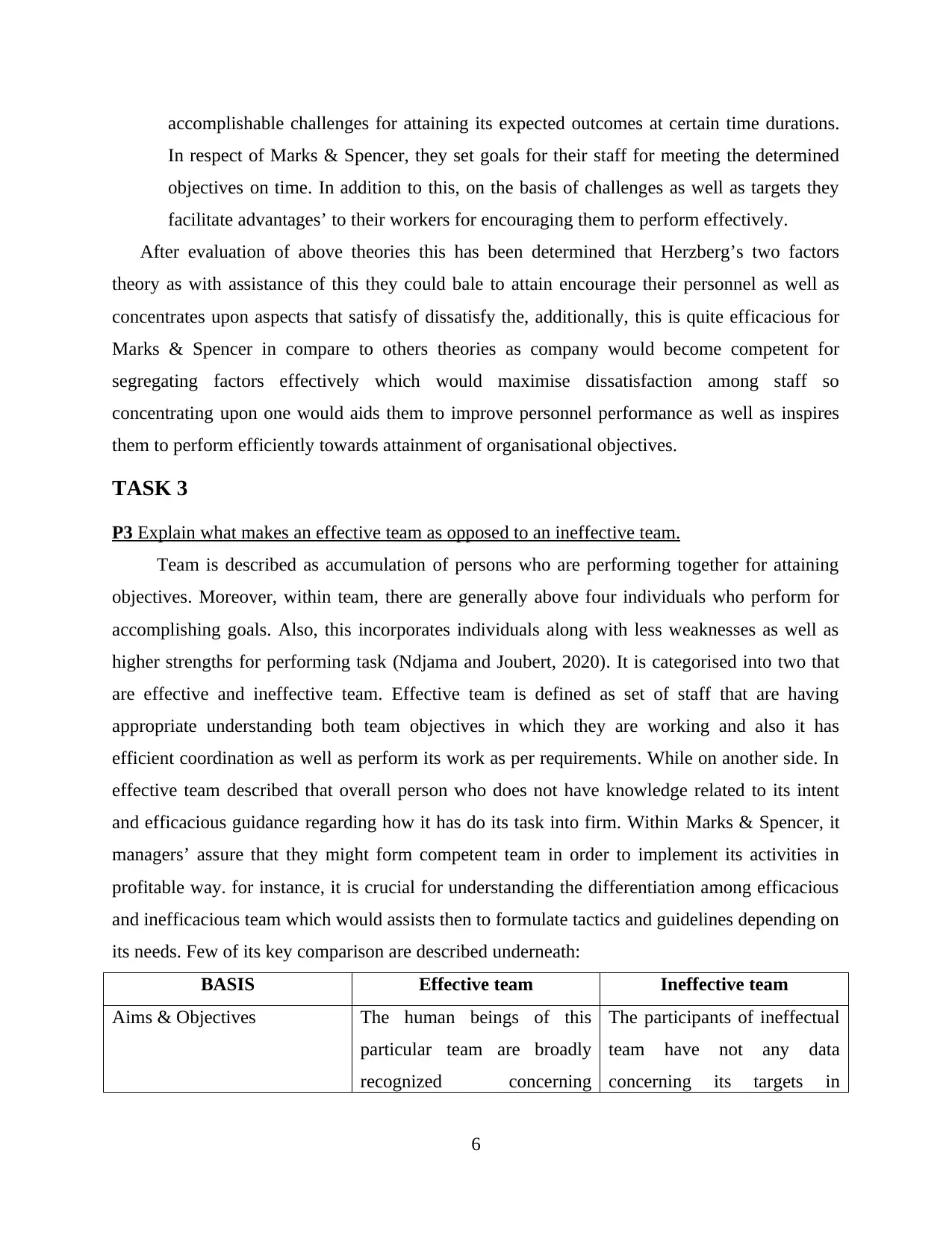
accomplishable challenges for attaining its expected outcomes at certain time durations.
In respect of Marks & Spencer, they set goals for their staff for meeting the determined
objectives on time. In addition to this, on the basis of challenges as well as targets they
facilitate advantages’ to their workers for encouraging them to perform effectively.
After evaluation of above theories this has been determined that Herzberg’s two factors
theory as with assistance of this they could bale to attain encourage their personnel as well as
concentrates upon aspects that satisfy of dissatisfy the, additionally, this is quite efficacious for
Marks & Spencer in compare to others theories as company would become competent for
segregating factors effectively which would maximise dissatisfaction among staff so
concentrating upon one would aids them to improve personnel performance as well as inspires
them to perform efficiently towards attainment of organisational objectives.
TASK 3
P3 Explain what makes an effective team as opposed to an ineffective team.
Team is described as accumulation of persons who are performing together for attaining
objectives. Moreover, within team, there are generally above four individuals who perform for
accomplishing goals. Also, this incorporates individuals along with less weaknesses as well as
higher strengths for performing task (Ndjama and Joubert, 2020). It is categorised into two that
are effective and ineffective team. Effective team is defined as set of staff that are having
appropriate understanding both team objectives in which they are working and also it has
efficient coordination as well as perform its work as per requirements. While on another side. In
effective team described that overall person who does not have knowledge related to its intent
and efficacious guidance regarding how it has do its task into firm. Within Marks & Spencer, it
managers’ assure that they might form competent team in order to implement its activities in
profitable way. for instance, it is crucial for understanding the differentiation among efficacious
and inefficacious team which would assists then to formulate tactics and guidelines depending on
its needs. Few of its key comparison are described underneath:
BASIS Effective team Ineffective team
Aims & Objectives The human beings of this
particular team are broadly
recognized concerning
The participants of ineffectual
team have not any data
concerning its targets in
6
In respect of Marks & Spencer, they set goals for their staff for meeting the determined
objectives on time. In addition to this, on the basis of challenges as well as targets they
facilitate advantages’ to their workers for encouraging them to perform effectively.
After evaluation of above theories this has been determined that Herzberg’s two factors
theory as with assistance of this they could bale to attain encourage their personnel as well as
concentrates upon aspects that satisfy of dissatisfy the, additionally, this is quite efficacious for
Marks & Spencer in compare to others theories as company would become competent for
segregating factors effectively which would maximise dissatisfaction among staff so
concentrating upon one would aids them to improve personnel performance as well as inspires
them to perform efficiently towards attainment of organisational objectives.
TASK 3
P3 Explain what makes an effective team as opposed to an ineffective team.
Team is described as accumulation of persons who are performing together for attaining
objectives. Moreover, within team, there are generally above four individuals who perform for
accomplishing goals. Also, this incorporates individuals along with less weaknesses as well as
higher strengths for performing task (Ndjama and Joubert, 2020). It is categorised into two that
are effective and ineffective team. Effective team is defined as set of staff that are having
appropriate understanding both team objectives in which they are working and also it has
efficient coordination as well as perform its work as per requirements. While on another side. In
effective team described that overall person who does not have knowledge related to its intent
and efficacious guidance regarding how it has do its task into firm. Within Marks & Spencer, it
managers’ assure that they might form competent team in order to implement its activities in
profitable way. for instance, it is crucial for understanding the differentiation among efficacious
and inefficacious team which would assists then to formulate tactics and guidelines depending on
its needs. Few of its key comparison are described underneath:
BASIS Effective team Ineffective team
Aims & Objectives The human beings of this
particular team are broadly
recognized concerning
The participants of ineffectual
team have not any data
concerning its targets in
6
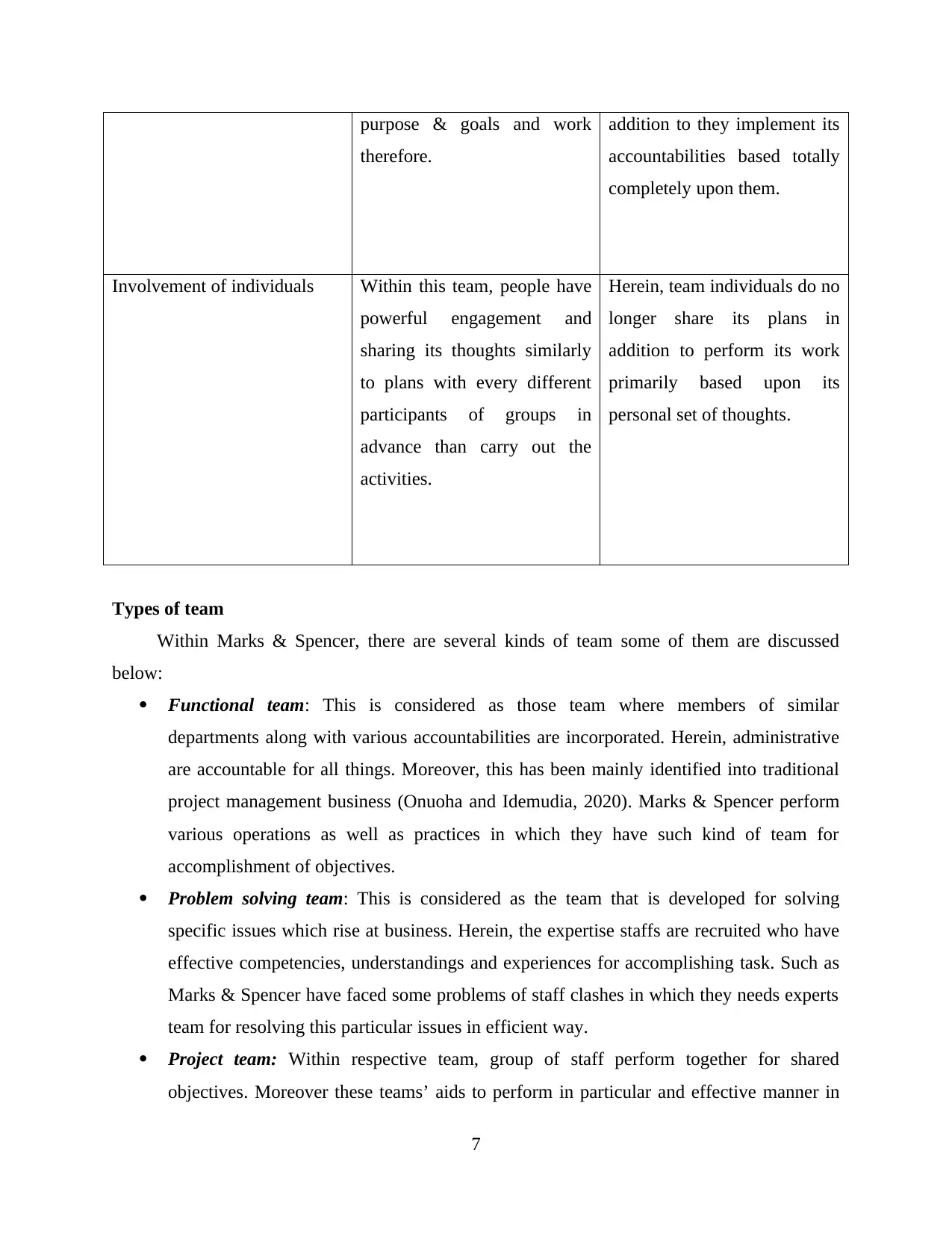
purpose & goals and work
therefore.
addition to they implement its
accountabilities based totally
completely upon them.
Involvement of individuals Within this team, people have
powerful engagement and
sharing its thoughts similarly
to plans with every different
participants of groups in
advance than carry out the
activities.
Herein, team individuals do no
longer share its plans in
addition to perform its work
primarily based upon its
personal set of thoughts.
Types of team
Within Marks & Spencer, there are several kinds of team some of them are discussed
below:
Functional team: This is considered as those team where members of similar
departments along with various accountabilities are incorporated. Herein, administrative
are accountable for all things. Moreover, this has been mainly identified into traditional
project management business (Onuoha and Idemudia, 2020). Marks & Spencer perform
various operations as well as practices in which they have such kind of team for
accomplishment of objectives.
Problem solving team: This is considered as the team that is developed for solving
specific issues which rise at business. Herein, the expertise staffs are recruited who have
effective competencies, understandings and experiences for accomplishing task. Such as
Marks & Spencer have faced some problems of staff clashes in which they needs experts
team for resolving this particular issues in efficient way.
Project team: Within respective team, group of staff perform together for shared
objectives. Moreover these teams’ aids to perform in particular and effective manner in
7
therefore.
addition to they implement its
accountabilities based totally
completely upon them.
Involvement of individuals Within this team, people have
powerful engagement and
sharing its thoughts similarly
to plans with every different
participants of groups in
advance than carry out the
activities.
Herein, team individuals do no
longer share its plans in
addition to perform its work
primarily based upon its
personal set of thoughts.
Types of team
Within Marks & Spencer, there are several kinds of team some of them are discussed
below:
Functional team: This is considered as those team where members of similar
departments along with various accountabilities are incorporated. Herein, administrative
are accountable for all things. Moreover, this has been mainly identified into traditional
project management business (Onuoha and Idemudia, 2020). Marks & Spencer perform
various operations as well as practices in which they have such kind of team for
accomplishment of objectives.
Problem solving team: This is considered as the team that is developed for solving
specific issues which rise at business. Herein, the expertise staffs are recruited who have
effective competencies, understandings and experiences for accomplishing task. Such as
Marks & Spencer have faced some problems of staff clashes in which they needs experts
team for resolving this particular issues in efficient way.
Project team: Within respective team, group of staff perform together for shared
objectives. Moreover these teams’ aids to perform in particular and effective manner in
7
⊘ This is a preview!⊘
Do you want full access?
Subscribe today to unlock all pages.

Trusted by 1+ million students worldwide
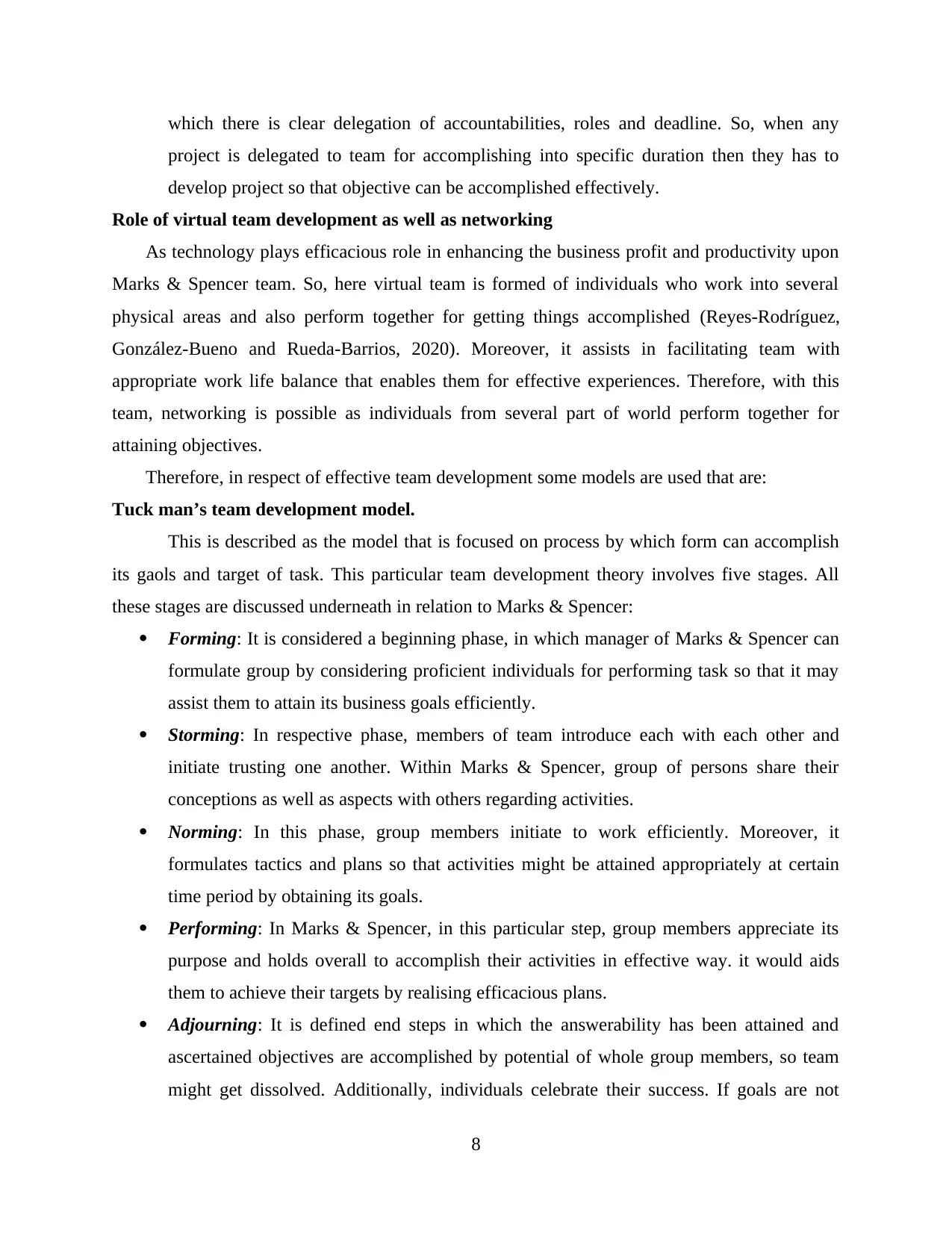
which there is clear delegation of accountabilities, roles and deadline. So, when any
project is delegated to team for accomplishing into specific duration then they has to
develop project so that objective can be accomplished effectively.
Role of virtual team development as well as networking
As technology plays efficacious role in enhancing the business profit and productivity upon
Marks & Spencer team. So, here virtual team is formed of individuals who work into several
physical areas and also perform together for getting things accomplished (Reyes-Rodríguez,
González-Bueno and Rueda-Barrios, 2020). Moreover, it assists in facilitating team with
appropriate work life balance that enables them for effective experiences. Therefore, with this
team, networking is possible as individuals from several part of world perform together for
attaining objectives.
Therefore, in respect of effective team development some models are used that are:
Tuck man’s team development model.
This is described as the model that is focused on process by which form can accomplish
its gaols and target of task. This particular team development theory involves five stages. All
these stages are discussed underneath in relation to Marks & Spencer:
Forming: It is considered a beginning phase, in which manager of Marks & Spencer can
formulate group by considering proficient individuals for performing task so that it may
assist them to attain its business goals efficiently.
Storming: In respective phase, members of team introduce each with each other and
initiate trusting one another. Within Marks & Spencer, group of persons share their
conceptions as well as aspects with others regarding activities.
Norming: In this phase, group members initiate to work efficiently. Moreover, it
formulates tactics and plans so that activities might be attained appropriately at certain
time period by obtaining its goals.
Performing: In Marks & Spencer, in this particular step, group members appreciate its
purpose and holds overall to accomplish their activities in effective way. it would aids
them to achieve their targets by realising efficacious plans.
Adjourning: It is defined end steps in which the answerability has been attained and
ascertained objectives are accomplished by potential of whole group members, so team
might get dissolved. Additionally, individuals celebrate their success. If goals are not
8
project is delegated to team for accomplishing into specific duration then they has to
develop project so that objective can be accomplished effectively.
Role of virtual team development as well as networking
As technology plays efficacious role in enhancing the business profit and productivity upon
Marks & Spencer team. So, here virtual team is formed of individuals who work into several
physical areas and also perform together for getting things accomplished (Reyes-Rodríguez,
González-Bueno and Rueda-Barrios, 2020). Moreover, it assists in facilitating team with
appropriate work life balance that enables them for effective experiences. Therefore, with this
team, networking is possible as individuals from several part of world perform together for
attaining objectives.
Therefore, in respect of effective team development some models are used that are:
Tuck man’s team development model.
This is described as the model that is focused on process by which form can accomplish
its gaols and target of task. This particular team development theory involves five stages. All
these stages are discussed underneath in relation to Marks & Spencer:
Forming: It is considered a beginning phase, in which manager of Marks & Spencer can
formulate group by considering proficient individuals for performing task so that it may
assist them to attain its business goals efficiently.
Storming: In respective phase, members of team introduce each with each other and
initiate trusting one another. Within Marks & Spencer, group of persons share their
conceptions as well as aspects with others regarding activities.
Norming: In this phase, group members initiate to work efficiently. Moreover, it
formulates tactics and plans so that activities might be attained appropriately at certain
time period by obtaining its goals.
Performing: In Marks & Spencer, in this particular step, group members appreciate its
purpose and holds overall to accomplish their activities in effective way. it would aids
them to achieve their targets by realising efficacious plans.
Adjourning: It is defined end steps in which the answerability has been attained and
ascertained objectives are accomplished by potential of whole group members, so team
might get dissolved. Additionally, individuals celebrate their success. If goals are not
8
Paraphrase This Document
Need a fresh take? Get an instant paraphrase of this document with our AI Paraphraser
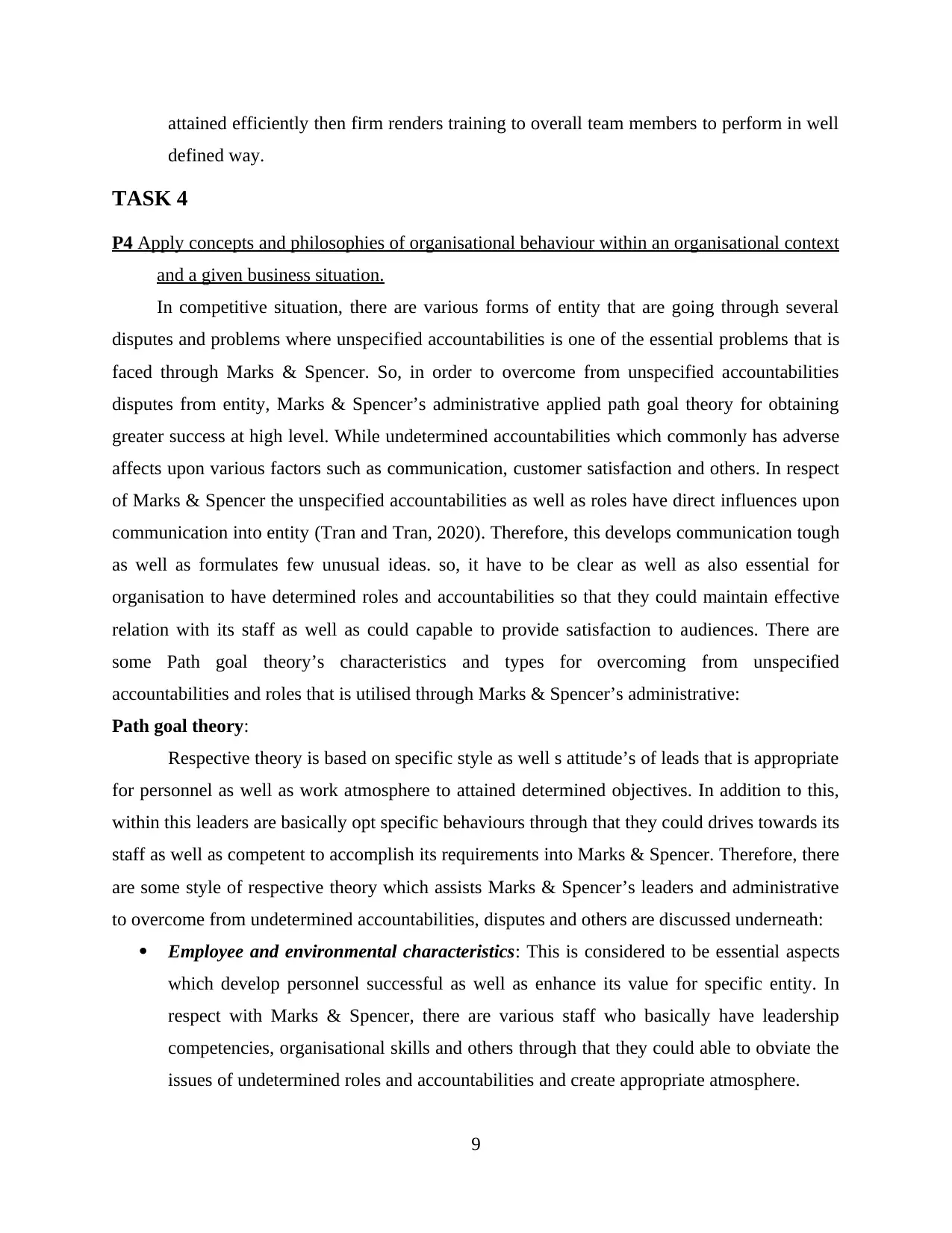
attained efficiently then firm renders training to overall team members to perform in well
defined way.
TASK 4
P4 Apply concepts and philosophies of organisational behaviour within an organisational context
and a given business situation.
In competitive situation, there are various forms of entity that are going through several
disputes and problems where unspecified accountabilities is one of the essential problems that is
faced through Marks & Spencer. So, in order to overcome from unspecified accountabilities
disputes from entity, Marks & Spencer’s administrative applied path goal theory for obtaining
greater success at high level. While undetermined accountabilities which commonly has adverse
affects upon various factors such as communication, customer satisfaction and others. In respect
of Marks & Spencer the unspecified accountabilities as well as roles have direct influences upon
communication into entity (Tran and Tran, 2020). Therefore, this develops communication tough
as well as formulates few unusual ideas. so, it have to be clear as well as also essential for
organisation to have determined roles and accountabilities so that they could maintain effective
relation with its staff as well as could capable to provide satisfaction to audiences. There are
some Path goal theory’s characteristics and types for overcoming from unspecified
accountabilities and roles that is utilised through Marks & Spencer’s administrative:
Path goal theory:
Respective theory is based on specific style as well s attitude’s of leads that is appropriate
for personnel as well as work atmosphere to attained determined objectives. In addition to this,
within this leaders are basically opt specific behaviours through that they could drives towards its
staff as well as competent to accomplish its requirements into Marks & Spencer. Therefore, there
are some style of respective theory which assists Marks & Spencer’s leaders and administrative
to overcome from undetermined accountabilities, disputes and others are discussed underneath:
Employee and environmental characteristics: This is considered to be essential aspects
which develop personnel successful as well as enhance its value for specific entity. In
respect with Marks & Spencer, there are various staff who basically have leadership
competencies, organisational skills and others through that they could able to obviate the
issues of undetermined roles and accountabilities and create appropriate atmosphere.
9
defined way.
TASK 4
P4 Apply concepts and philosophies of organisational behaviour within an organisational context
and a given business situation.
In competitive situation, there are various forms of entity that are going through several
disputes and problems where unspecified accountabilities is one of the essential problems that is
faced through Marks & Spencer. So, in order to overcome from unspecified accountabilities
disputes from entity, Marks & Spencer’s administrative applied path goal theory for obtaining
greater success at high level. While undetermined accountabilities which commonly has adverse
affects upon various factors such as communication, customer satisfaction and others. In respect
of Marks & Spencer the unspecified accountabilities as well as roles have direct influences upon
communication into entity (Tran and Tran, 2020). Therefore, this develops communication tough
as well as formulates few unusual ideas. so, it have to be clear as well as also essential for
organisation to have determined roles and accountabilities so that they could maintain effective
relation with its staff as well as could capable to provide satisfaction to audiences. There are
some Path goal theory’s characteristics and types for overcoming from unspecified
accountabilities and roles that is utilised through Marks & Spencer’s administrative:
Path goal theory:
Respective theory is based on specific style as well s attitude’s of leads that is appropriate
for personnel as well as work atmosphere to attained determined objectives. In addition to this,
within this leaders are basically opt specific behaviours through that they could drives towards its
staff as well as competent to accomplish its requirements into Marks & Spencer. Therefore, there
are some style of respective theory which assists Marks & Spencer’s leaders and administrative
to overcome from undetermined accountabilities, disputes and others are discussed underneath:
Employee and environmental characteristics: This is considered to be essential aspects
which develop personnel successful as well as enhance its value for specific entity. In
respect with Marks & Spencer, there are various staff who basically have leadership
competencies, organisational skills and others through that they could able to obviate the
issues of undetermined roles and accountabilities and create appropriate atmosphere.
9
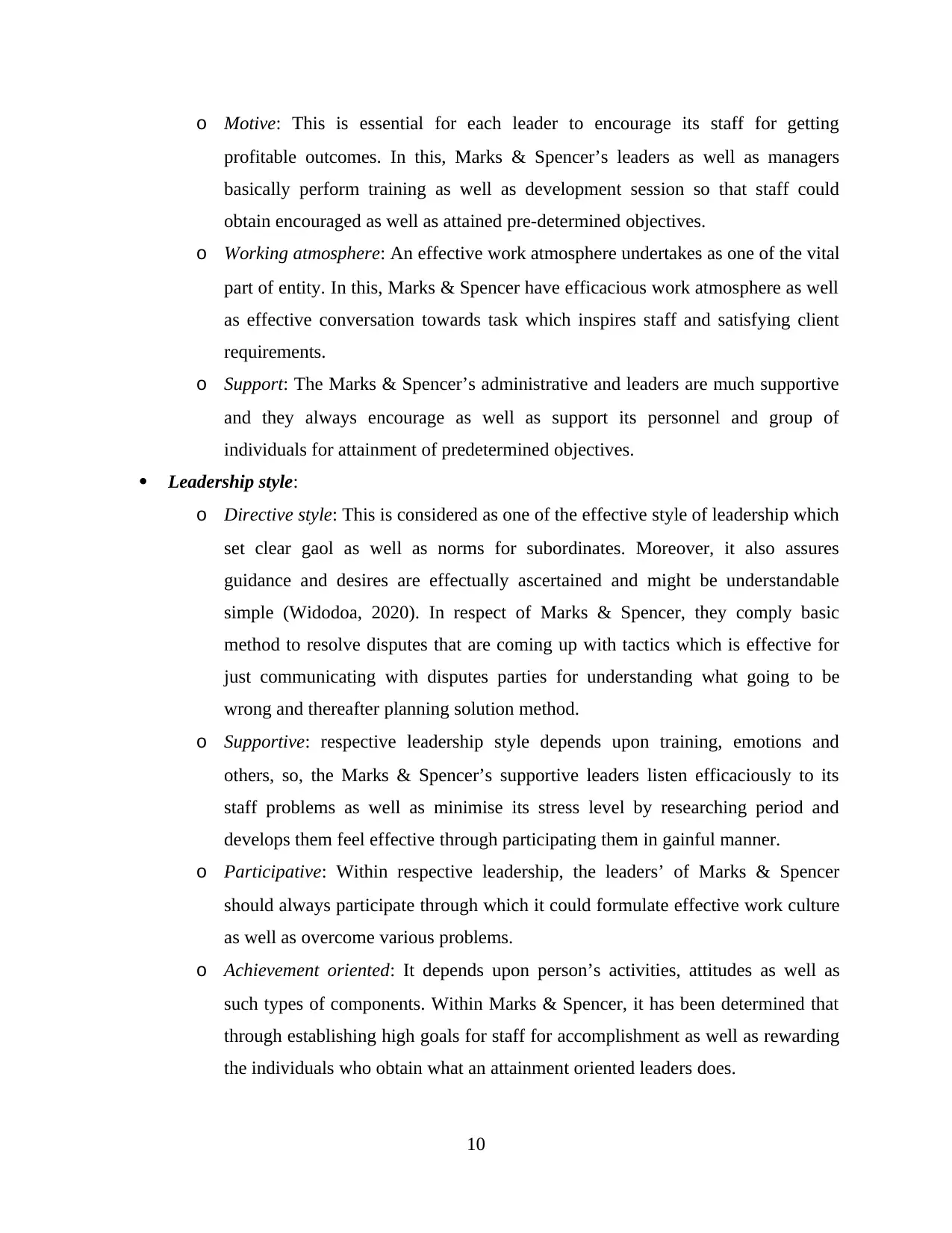
o Motive: This is essential for each leader to encourage its staff for getting
profitable outcomes. In this, Marks & Spencer’s leaders as well as managers
basically perform training as well as development session so that staff could
obtain encouraged as well as attained pre-determined objectives.
o Working atmosphere: An effective work atmosphere undertakes as one of the vital
part of entity. In this, Marks & Spencer have efficacious work atmosphere as well
as effective conversation towards task which inspires staff and satisfying client
requirements.
o Support: The Marks & Spencer’s administrative and leaders are much supportive
and they always encourage as well as support its personnel and group of
individuals for attainment of predetermined objectives.
Leadership style:
o Directive style: This is considered as one of the effective style of leadership which
set clear gaol as well as norms for subordinates. Moreover, it also assures
guidance and desires are effectually ascertained and might be understandable
simple (Widodoa, 2020). In respect of Marks & Spencer, they comply basic
method to resolve disputes that are coming up with tactics which is effective for
just communicating with disputes parties for understanding what going to be
wrong and thereafter planning solution method.
o Supportive: respective leadership style depends upon training, emotions and
others, so, the Marks & Spencer’s supportive leaders listen efficaciously to its
staff problems as well as minimise its stress level by researching period and
develops them feel effective through participating them in gainful manner.
o Participative: Within respective leadership, the leaders’ of Marks & Spencer
should always participate through which it could formulate effective work culture
as well as overcome various problems.
o Achievement oriented: It depends upon person’s activities, attitudes as well as
such types of components. Within Marks & Spencer, it has been determined that
through establishing high goals for staff for accomplishment as well as rewarding
the individuals who obtain what an attainment oriented leaders does.
10
profitable outcomes. In this, Marks & Spencer’s leaders as well as managers
basically perform training as well as development session so that staff could
obtain encouraged as well as attained pre-determined objectives.
o Working atmosphere: An effective work atmosphere undertakes as one of the vital
part of entity. In this, Marks & Spencer have efficacious work atmosphere as well
as effective conversation towards task which inspires staff and satisfying client
requirements.
o Support: The Marks & Spencer’s administrative and leaders are much supportive
and they always encourage as well as support its personnel and group of
individuals for attainment of predetermined objectives.
Leadership style:
o Directive style: This is considered as one of the effective style of leadership which
set clear gaol as well as norms for subordinates. Moreover, it also assures
guidance and desires are effectually ascertained and might be understandable
simple (Widodoa, 2020). In respect of Marks & Spencer, they comply basic
method to resolve disputes that are coming up with tactics which is effective for
just communicating with disputes parties for understanding what going to be
wrong and thereafter planning solution method.
o Supportive: respective leadership style depends upon training, emotions and
others, so, the Marks & Spencer’s supportive leaders listen efficaciously to its
staff problems as well as minimise its stress level by researching period and
develops them feel effective through participating them in gainful manner.
o Participative: Within respective leadership, the leaders’ of Marks & Spencer
should always participate through which it could formulate effective work culture
as well as overcome various problems.
o Achievement oriented: It depends upon person’s activities, attitudes as well as
such types of components. Within Marks & Spencer, it has been determined that
through establishing high goals for staff for accomplishment as well as rewarding
the individuals who obtain what an attainment oriented leaders does.
10
⊘ This is a preview!⊘
Do you want full access?
Subscribe today to unlock all pages.

Trusted by 1+ million students worldwide
1 out of 14
Related Documents
Your All-in-One AI-Powered Toolkit for Academic Success.
+13062052269
info@desklib.com
Available 24*7 on WhatsApp / Email
![[object Object]](/_next/static/media/star-bottom.7253800d.svg)
Unlock your academic potential
Copyright © 2020–2025 A2Z Services. All Rights Reserved. Developed and managed by ZUCOL.





